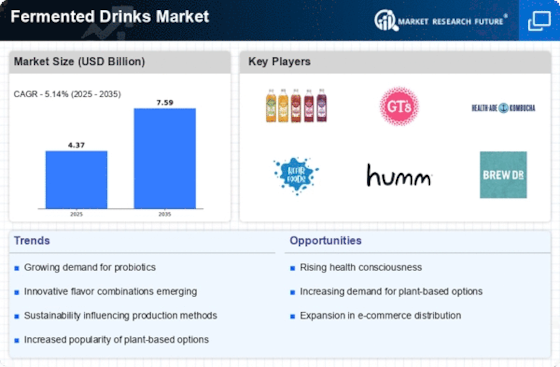Top Industry Leaders in the Fermented Drinks Market

Strategies Adopted by Fermented Drinks Key Players
The fermented drinks market has witnessed significant growth in recent years, driven by increasing consumer awareness of the health benefits associated with these beverages. As the market continues to evolveThe competitive landscape has become more dynamic, with key players employing various strategies to gain a competitive edge.
List of Key Players:
- Döhler (Germany)
- Sula Vineyards Pvt. Ltd (India)
- Caldwell Bio Fermentation Canada Inc. (Canada)
- KeVita Inc. (California)
- Lifeway Foods Inc. (the US)
- Puna Noni Naturals (the US)
- Nestlé S.A. (Switzerland)
- PepsiCo Inc. (the US)
- Heineken (Netherlands)
- The Kefir Company (New Zealand)
- Yakult Honsha Co. Ltd. (Japan)
- The Coca-Cola Company (the US)
Product Diversification:
Leading companies have focused on expanding their product portfolios to include a variety of fermented drinks. This strategy helps cater to diverse consumer preferences and capitalize on emerging trends.
Marketing and Branding:
Robust marketing and branding initiatives have been crucial for key players. Creating awareness about the health benefits of fermented drinks and emphasizing their unique selling propositions has been a common strategy.
Distribution Network Expansion:
Companies with established distribution networks, such as Coca-Cola and PepsiCo, have utilized their extensive reach to ensure wide market penetration for their fermented drink offerings.
Market Share Analysis:
Brand Recognition:
Established brands like Coca-Cola and PepsiCo have an advantage in terms of brand recognition, influencing consumer trust and preferences.
Product Innovation:
Companies that invest in research and development to introduce innovative flavors and formulations are better positioned to capture market share, as consumers are often drawn to novel and unique offerings.
Pricing Strategies:
Competitive pricing strategies play a crucial role in market share dynamics. Companies adopting effective pricing models can attract a broader consumer base.
New and Emerging Companies:
The fermented drinks market has seen the emergence of several new players striving to gain a foothold in this competitive space. Companies like HealthBrew and Fermenta are leveraging niche markets with unique offerings, targeting health-conscious consumers seeking alternatives to traditional beverages.
Industry News and Current Companies:
Recent developments in the industry include partnerships and collaborations between fermented drink manufacturers and health-focused organizations. For instance, a partnership between GT's Living Foods and a prominent health foundation to promote the benefits of probiotics garnered attention in industry news.
Investment Trends:
Investors have shown a keen interest in the fermented drinks market, driven by its growth potential. Funding rounds for emerging companies in this sector have been on the rise, reflecting investor confidence in the market's future prospects.
Competitive Scenario:
The competitive scenario in the fermented drinks market is characterized by intense rivalry among key players. Companies are investing in research, marketing, and distribution to strengthen their positions. Brand loyalty, innovative product offerings, and strategic alliances are key factors influencing the overall competitive landscape.
Recent Developments
The fermented drinks market witnessed a notable shift towards sustainability. Key players, including Coca-Cola and PepsiCo, announced initiatives to reduce their carbon footprint in the production and distribution of fermented beverages. This move aligns with the growing consumer preference for eco-friendly products and reflects a commitment to environmental responsibility within the industry.











